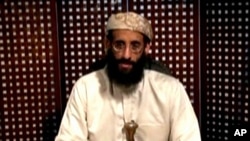Radical U.S.-born cleric Anwar al-Awlaki has been killed in an airstrike in Yemen that news reports say was orchestrated by the U.S. Central Intelligence Agency.
Missiles fired from a drone aircraft killed Awlaki early Friday as he rode in a convoy in eastern Yemen.
President Barack Obama called Awlaki's death a "major blow" to one of al-Qaida's most active affiliates.
Speaking to a military audience outside Washington, Mr. Obama said the operation that killed Awlaki is proof that the terrorist group and its affiliates cannot find a safe haven anywhere in the world.
|
Quick Facts: Anwar al-Awlaki |
|
Western news organizations quote U.S. officials as saying the raid was coordinated by the CIA and led by U.S. Joint Special Operations Command, the counterterrorism unit that led the May operation killing Osama bin Laden.
Several other suspected militants were killed in the operation, including Samir Khan, an American of Pakistani origin who produced an English-language magazine for al-Qaida on the Internet.
Awlaki was linked to the group al-Qaida in the Arabian Peninsula, based in Yemen. He was wanted by both the U.S. and Yemen for his suspected role in terrorist attacks.
Those attacks included the December 2009 attempted bombing of a U.S. airliner that was approaching the U.S. city of Detroit.
Authorities believe Awlaki advised the suspected bomber, Nigerian Umar Farouk Abdulmutallab. Investigators believe Awlaki also played a role in a deadly attack, a month earier, at a U.S. military base.
They say Awlaki may have advised U.S. Major Nidal Malik Hasan, who is accused of killing 13 people in the attack.
Awlaki's death comes with Yemen in a political crisis, marked by heightened calls for President Abdullah Saleh's resignation.
Activists say thousands of anti-government protesters rallied in the capital, Sana'a on Friday and in the southern city of Taiz.
In an interview with The Washington Post and Time magazine this week, Mr. Saleh said a political transition plan crafted by Yemen's Gulf neighbors made it clear that "all elements" contributing to the country's civil unrest should be removed.
The president warned it would be "very dangerous" if his rivals, General Ali Mohsen al-Ahmar, who defected to the opposition, and Hamid al-Ahmar, a telecom tycoon and politician whose brother heads Yemen's most powerful tribal confederation, were to retain their positions after he resigns.
He said that outcome could "lead to civil war." Mr. Saleh has agreed to the plan crafted by the Gulf Cooperation Council three times since April.
However, each time he has backed out before the deal could be signed.
Some information for this report was provided by AP, AFP and Reuters.




